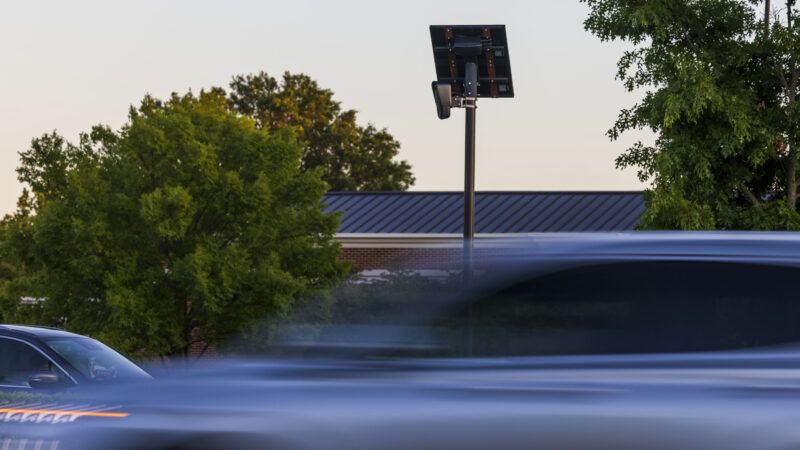Warrantless Use of License Plate Reader Cameras Is Unconstitutional
A new campaign pushes back against the widespread use of automatic license plate readers without warrants.

Over the past two decades, Americans have been subject to one revelation after another of how little privacy we actually have, with both government and industry engaging in varying degrees of surveillance.
This week, the Institute for Justice (I.J.), a public-interest law firm, announced the Plate Privacy Project—"a nationwide campaign to push back against the arbitrary and unrestrained use of automatic license plate reader (ALPR) cameras in thousands of American communities," per an I.J. press release.
While they may sound like the stuff of science fiction, ALPRs are very real and increasingly common. "These systems are a combination of high-speed cameras and optical character recognition technology that can identify license plates and turn them into machine-readable text," according to the Electronic Frontier Foundation (EFF). Cameras can be mounted on poles at traffic stops or just along the roadside, while mobile versions can be affixed to police cars. Once captured, all information is uploaded to a central database "along with the time, date, and GPS coordinates." I.J. notes that ALPRs "can scan up to 2,000 plates per minute, essentially guaranteeing every vehicle is captured."
"Unlike red-light cameras or speed cameras that are triggered by specific violations, these cameras photograph every vehicle that drives by and can use artificial intelligence to create a profile with identifying information that then gets stored in a massive database," I.J. adds. "Once that happens, officials can search the database for any vehicle they wish, all without a warrant. And departments around the country are automatically sharing data with each other, making it simple for police anywhere to track drivers' movements. All of this arbitrary discretion threatens people's privacy, security, and freedom of movement by creating an atmosphere where everyone knows they are being watched and tracked whenever they hit the road."
The project, I.J. pledges, "will propose model legislation in state legislatures to protect against warrantless ALPR surveillance, partner with local grassroots activists to help them resist the use of these cameras in their communities, and continue fighting in the courts to strengthen the Fourth Amendment's protections against this new form of warrantless surveillance. Additionally, the project's website will provide reliable data for people to learn about the scope of ALPR surveillance in their own community."
There is reason to be concerned. "These tools are now relatively commonplace in policing," according to a 2024 Congressional Research Service report. "According to the Bureau of Justice Statistics' 2020 Law Enforcement Management and Administrative Statistics Survey, larger law enforcement offices were more likely to use ALPR technology than smaller offices; nearly 90% of sheriffs' offices with 500 or more sworn deputies reported using the technology, and of police departments serving over 1 million residents, 100% used ALPRs."
This ubiquitous surveillance has dangerous consequences. In August 2020, Colorado police officers pulled over and arrested Brittney Gilliam—even handcuffing her daughter and nieces, who were also in the car, and forcing them to lie face down on the pavement—after an ALPR caught her license plate and flagged it as a stolen vehicle. Officers later released her after they realized Gilliam's SUV had Colorado plates, while the stolen vehicle in question was a motorcycle with a Montana tag.
Just within the past couple of years, license plate surveillance has grown. Last year, Sacramento, California, officials discovered the sheriff's office was routinely sharing license plate information with agencies in other states—despite being prohibited by state law. Illinois similarly bars sharing ALPR data with immigration enforcement authorities, yet records suggest U.S. Immigration and Customs Enforcement (ICE) may have gained access to cameras in over 5,000 communities nationwide.
Illinois uses ALPR systems from Flock Safety, a private company with over 40,000 cameras across the country. "Flock is building a giant camera network that records people's comings and goings across the nation, and then makes that data available for search by any of its law enforcement customers," according to the American Civil Liberties Union. "Every new customer that buys and installs the company's cameras extends Flock's network, contributing to the creation of a centralized mass surveillance system of Orwellian scope."
One of Flock's clients is the city of Norfolk, Virginia, which installed 172 ALPRs in 2023. Last year, I.J. sued the city and its police department in federal court, saying that using or accessing its ALPR system constitutes an unlawful search prohibited by the Fourth Amendment. "Nothing in the Flock Agreement or the [Norfolk Police Department]'s policy requires officers to establish probable cause or obtain a warrant to access the data," per the lawsuit. "And, in practice, officers commonly do access the data without probable cause or a warrant."
"In Norfolk, no one can escape the government's 172 unblinking eyes," the lawsuit cautioned. "And the City's dragnet is only expanding: On September 24, 2024, the Chief of Police announced plans to acquire 65 more cameras in the future."
In February, Chief Judge Mark S. Davis of the U.S. District Court for the Eastern District of Virginia denied the city's motion to dismiss, allowing I.J.'s lawsuit to proceed.
With the Plate Privacy Project, I.J. now intends to take that success further. Thankfully, there is reason to believe the American people may be on I.J.'s side: As Reason's Jacob Sullum wrote this week, multiple towns around the country have recently terminated ALPR contracts with Flock Safety after community backlash.
